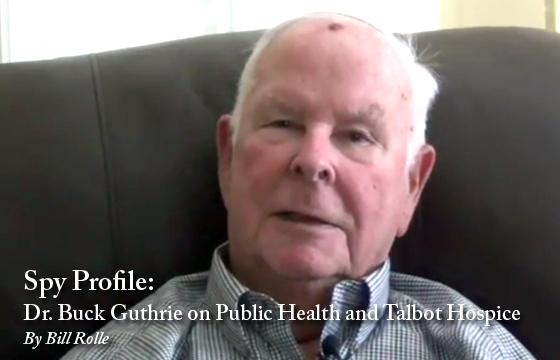There are many great reasons to live in Talbot County, not the least of which is getting to know some really impressive people.
We were fortunate recently to have the opportunity to sit and talk with Dr. Eugene Guthrie, better known as “Buck”, and his wife, Betts, at their home in William Hill Manor.
They’re both originally from the Washington area and met through mutual friends while at Woodrow Wilson HS.
The video is approximately eight minutes in length
Dr. Guthrie, as many of you know, was a co-founder of the Talbot Hospice Foundation more than 30 years ago and continues to serve the Foundation as a Board Member “Emeritus”.
Betts also was actively involved with Hospice from the beginning. There were no paid staff at that time and she coordinated the 100-percent volunteer effort. They invited friends and neighbors to join in the task of building what is so successful today.
The long road to the local Hospice’ success began when Dr. Guthrie chose the public health service over clinical work. He reached that decision following studies at Haverford, Duke, University of North Carolina and medical school at George Washington University. He acquired his Masters in Public Health from the University of Michigan and completed his residency in California. It was there that Buck and Betts met and best-friended Dr. Davey, a gentleman who shaped their thinking as well as many others’ thinking.
Dr. Guthrie served as an officer in the medical corps of the US Coast Guard during WWII and after medical school he entered the Commissioned Officers Association of the US Public Health Service with the Naval rank of Captain. He retired from the USPHS as Associate Surgeon General with the Naval rank of Rear Admiral.
He developed an interest in chronic disease while at the USPHS and headed the Division of Chronic Diseases, dealing with the prevention and control of them. He worked on controlling Polio, came to know Dr. Salk and was involved in the development of the Iron Lung to ease the breathing of those inflicted by the disease.
The highlight of his career was to help create and manage the Public Health Service’s anti- smoking campaign. His studies indicated that addiction was the problem and it would have a major impact on our nation’s overall public health. He took on the major advocates of smoking, the tobacco companies and the advertising industry, in an attempt to educate the public as to the hazards of smoking based on the use of nicotine.
He personally had stopped smoking a pack a day, prior to the campaign, once he understood the danger. However, Betts was slower to take the same action but eventually followed Bucks advice. Dr. Guthrie remembers having to regularly remind Dr. Luther Terry, US Surgeon General, not to smoke in public during the anti smoking campaign.
The assignment ended with the now famous “Surgeon General’s Advisory committee’s Report on Smoking & Health” in 1964. It earned Dr. Guthrie the PHS Meritorious Service Award as well as being recognized by the Associated Press Annual Poll as 1964’s “Newsmaker of the Year in Science”.
The most visible accomplishment of his long career was his participation in the historic Surgeon General’s Report on Smoking and Health. His own knowledge, based on research, indicated that nicotine addiction was the problem and it would have a major impact on our nation’s overall public health. In 1962, he was selected to lead the committee of scientists and researchers commissioned by President Kennedy and Surgeon General Luther Terry to produce a comprehensive report on the effects of cigarette smoking.
Dr. Guthrie’s PHS career had many successes including the expansion of the Cervical Cancer Detection Program; advancing the diagnostic use of the technique of x-ray mammography to detect breast cancer; a cooperative effort with the US Space Program that resulted in the transmission of vital health readings from the Astronauts while in space; expansion of the first Coronary Care Units in hospitals and installed a new PHS program to develop and support community, comprehensive services for the mentally challenged as well as a new program for the prevention of neurological disease and blindness.
Dr. Guthrie was Associate Surgeon General, third-ranking in-line officer of the USPHS, under the Surgeon General and Deputy Surgeon General from 1966-68. During that period the budget increased from $2 billion to more than $3 billion and the service personnel numbered more than 36,000 of which 5,000 were commissioned officers.
The Maryland Governor appointed Dr. Guthrie as the first Executive Director of the State’s new Comprehensive Health Planning Agency. He began a number of major activities during his time there. They included the nation’s first state funding program for local health planning agencies; development of a state health plan based on the concept of primary, secondary and tertiary systems for health care; implementation of one of the nation’s first comprehensive “certificate of need” laws, dealing with new and existing hospitals, nursing homes and related healthcare facilities and development of legislation creating a statewide Health Care Cost Review Commission.
He founded and was President of the Academy of Comprehensive Health Planning, a national organization of state health planning organizations. His last position prior to retirement was Deputy State Health Officer of Dorchester and Talbot Counties. It was while there that he co-founded the Talbot Hospice Foundation.
Dr. Guthrie summed up his prestigious career when he said, “I believe that I have accomplished far more by being a US Public Health Service doctor than I would have as a clinician”. That statement best describes Dr. Guthrie and his accomplishments.



Write a Letter to the Editor on this Article
We encourage readers to offer their point of view on this article by submitting the following form. Editing is sometimes necessary and is done at the discretion of the editorial staff.